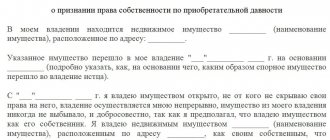Article 196 of the Civil Code of the Russian Federation establishes the general limitation period for real estate transactions at three years.
The concept of the limitation period is disclosed in the Civil Code of the Russian Federation. Here, this is a certain period of time during which, after a real estate transaction has been completed, it can be challenged with the newly obtained result being recognized as the only legal one.
The period begins to count not from the date when the contract was concluded and the transaction took place, but from the time when the person wishing to challenge the decision learned about it.
The maximum time during which you can apply for restoration of your rights in relation to a property is 10 years.
Extension of deadlines
The concept of extension of deadlines is not provided for in civil legislation as such, but based on practice, it is assumed that it is possible to increase the deadline in certain circumstances.
Such circumstances include:
- the presence of the interested person in places of deprivation of liberty or in such institutions from which leaving without permission is not allowed, for example, in the army. In this case, the three-year period begins from the moment when the person leaves the specified institution, and does not learn about the transaction that he wishes to challenge;
- being outside the Russian Federation or being in a coma, which does not contribute to the possibility of filing a lawsuit. When justifying the reason why the application was not submitted within the period established by the legislator, it is possible to submit it no later than 10 years from the date of establishment of this fact by the person wishing to challenge the transaction;
- if, after the existing well-known heirs assumed their rights, another one appeared whose rights were violated and whose interests were not taken into account when dividing the inheritance. In this case, the deprived heir can rectify the situation within 3 years from the moment he is recognized as a full heir.
Based on this, when purchasing real estate on the secondary market, you can be completely calm about the purity of the transaction only after at least 10 years have passed from the date of its implementation, i.e. if the deal took place in 2008, then in 2021 you don’t have to worry about anything.
What determines the statute of limitations?
The statute of limitations depends on the type of transaction. For insignificant ones, the standard period is 3 years. It begins to be counted from the day the deal was concluded.
For voidable transactions, the period is reduced to 1 year. But its course begins only from the moment the danger or threat under the influence of which the transaction was concluded has disappeared, or from the moment when the person should have received information about the violation of his rights.
The period cannot be more than 10 years (Article 196 of the Civil Code of the Russian Federation). It is also impossible to change it by mutual agreement of the parties.
Restoring a missed deadline
According to Part 1 of Article 205 of the Civil Code of the Russian Federation, the legislator has established deadlines for filing a claim in court regarding a transaction with any real estate property. However, not every reason will be recognized as valid and will relate specifically to the applicant’s personality. Only the court can decide on this.
A valid reason is recognized only in the case where a person actually did not have the opportunity to exercise his right in the last 6 months before the end of the generally established period and could not take all possible measures to realize his rights.
Statute of limitations for real estate transactions: procedure and rules for restoration
The article is devoted to the problems of the limitation period for real estate transactions. You will learn the features of this concept, the possibilities and methods of restoring the term, as well as a list of reasons that are considered valid for the court. We will also tell you about the procedure and rules for drawing up an application to extend the missed deadline.
The general concept of limitation period means the period of time during which a person has the right to restore his rights and interests after a violation has been discovered.
There is also a limitation period for transactions. This is the time during which the participant in the transaction has the right to challenge or cancel it.
It should not be counted from the date of conclusion, but from the moment when the party learned or should have known about the violation.
General limitation period for real estate agreements
The general limitation period for transactions is 36 months . It also applies to claims to recognize a real estate transaction as void, to claims to reclaim an apartment from a law-abiding buyer in favor of the former owner who left the residential premises against his will.
A claim to invalidate a voidable real estate transaction is filed within 1 year after a violation committed during its conclusion resulted in negative consequences.
There are exceptions to the general rule on procedural time:
- If an agreement is signed by a person under the influence of physical or psychological pressure, then the limitation period begins to run from the moment the pressure ceases. Such transactions are voidable and can be canceled within 12 months ;
- The limitation period for disputes regarding the application of the consequences of void transactions is valid from the date of their execution. The day of execution is the date of state registration of the purchase and sale agreement. The rule about the moment when a citizen should have learned about a violation of rights does not apply here.
Voidable and void transactions
There are two types of transactions that are not subject to the statute of limitations rules.
These transactions are already considered a priori invalid in our country:
- Void transactions are agreements reached contrary to the rules established by law, infringing on the rights and interests of other persons. For example, a situation where there was a donation of an object burdened with the interests of other persons, or one of the heirs alienated a house (apartment) without asking the permission of other heirs. In such a situation, persons whose rights have been violated file a claim in court against the administrator of the common property. The statute of limitations here is 3 years from the moment such a transaction became known to persons whose rights were violated.
- Voidable transactions are agreements reached as a result of deception, breach of trust, blackmail, threat of violence, and so on. In this case, the most important point is the need to prove the fact of third-party influence. In judicial practice, most often voidable transactions are those concluded with fraudsters. Another common variant of a voidable transaction is the situation when, after a divorce, one of the spouses sells jointly acquired property without the knowledge of the other spouse. In this case, the statute of limitations for filing a claim is 1 year from the day the victim became aware of the incident.
What are void and voidable real estate transactions?
Invalid transactions are void and voidable. Depending on this, the procedure for recognizing a transaction as invalid, the consequences and the limitation period itself are determined.
A worthless deal
The invalidity of a void transaction does not need to be confirmed in court: it should not and could not have been completed under the law. Therefore, from the very conclusion it is obviously considered invalid, and they go to court to recognize its consequences as such. Here are the grounds for insignificance:
- Acquisition of real estate as a result of a transaction using false documents , powers of attorney, forged signatures.
- Purchasing real estate from an incapacitated citizen.
- Purchasing an apartment from a child under 14 years of age. In life, this, of course, almost never happens, but it’s worth knowing about all the reasons.
- Acquiring an apartment as a result of an imaginary or feigned transaction. For example, a citizen who owes a large sum for a loan transferred his dacha to a close friend. The deal will be canceled and the property will be taken away.
- Acquisition of an apartment during a transaction that violated the law or other regulations. This happens especially often with housing in which there should be small children among the owners, for example, when buying an apartment using maternity capital.
Voidable transaction
Voidable transactions can only be declared invalid in court proceedings. Here are examples of voidable transactions:
- One of the parties entered into the transaction as a result of fraud, coercion, or threat from the other party.
- The victim entered into a transaction as a result of being materially misled. For example, when instead of a two-story country house, the buyer received a dilapidated two-story barn.
- The transaction was concluded by a person with limited legal capacity. This includes people who are addicted to alcohol or drugs.
- The transaction was concluded with a child between 14 and 18 years of age without the consent of parents, guardians or trustees.
- The deal was concluded for an apartment, not all of whose owners gave their consent.
After the transaction is declared invalid, both parties must return to the original owners everything they received under the transaction. The buyer returns the property, and the seller returns the money. If something happens to the property and there is no way to return it, it is necessary to reimburse the cost.
Participation of real estate companies
If you purchased real estate from a real estate company, and after five or six years it turned out that the rights of the seller were violated, then you can rest easy, since such a problem is a headache for legal entities, because it is the realtors who will be held responsible here, and even then, if the statute of limitations is reinstated.
ATTENTION !!! You should not make transactions with real estate on your own, as there is a high risk of getting into trouble associated with encumbering your apartment (house) with third parties. Only companies and their representatives (realtors), who are specialists in organizing real estate transactions, will guarantee the complete purity and transparency of the transaction, and will also be responsible for the correct organization of the transaction throughout the entire limitation period.
What is the statute of limitations?
Buyers should approach transactions with real estate especially responsibly. Even after the transfer of money and execution of papers, the transaction may be considered invalid if it was initially made illegally or violated someone’s rights.
Only through a judicial process can a transaction or its outcome be declared invalid. There is a limitation period for appeals - this is the period during which the injured party to the transaction and third parties whose rights have been violated can go to court and demand that the transaction be declared invalid.
The injured party has the right to initiate litigation at a later date, but then the defendant may claim that the time limit has expired, which will be a reason for dismissal of the claim.
The victim also has the opportunity to restore the statute of limitations. To do this, you need to prove to the court that there were good reasons for the absence: serious illness, temporary incapacity, helplessness.
Limitation period for completed real estate transactions, depending on the type
Having your own roof over your head is perhaps the most pressing issue for every person. But situations are different and you can easily fall for scammers or simply not know that other people have appropriated your property. Is everything really so hopeless and gloomy and there is no way to change the situation?
There is always a way out, and it is not necessary to break the law and restore justice yourself. The legislator gives us an effective “weapon” - statute of limitations, which will help challenge a real estate transaction. Let's learn how to use this legal category.
“Insignificant” deal – restoring justice
This category of transactions includes legal relations in which one of the parties simply did not have the right to enter into it. For example, they signed a contract for the purchase and sale of an apartment, and the fraudster skillfully concealed that he was not the owner (for example, he presented an invalid power of attorney). Or you made an exchange with a person who has nothing to do with the apartment.





